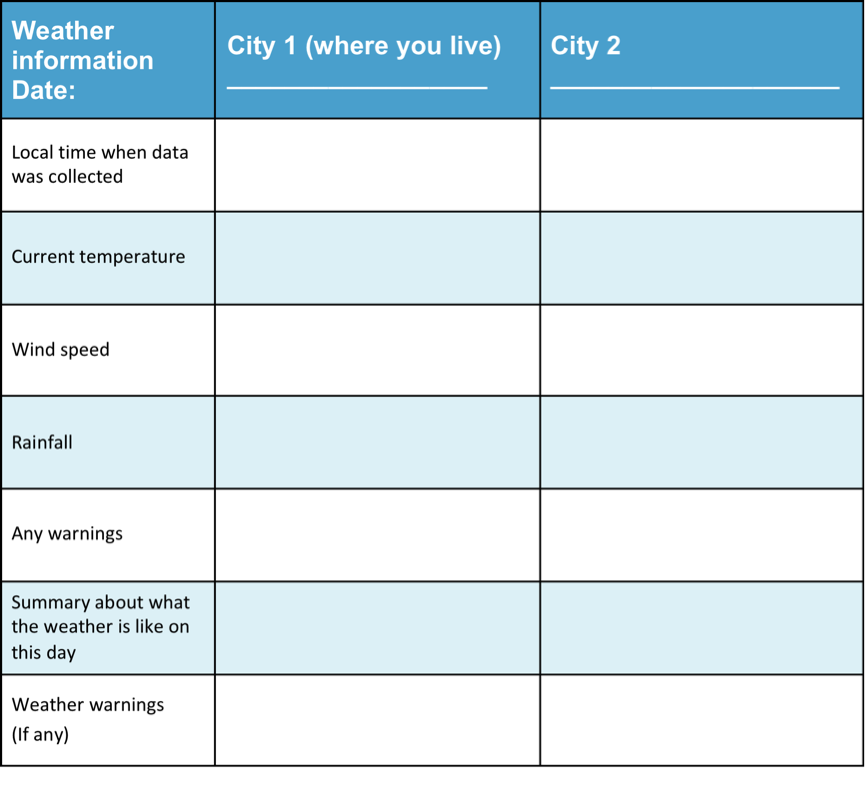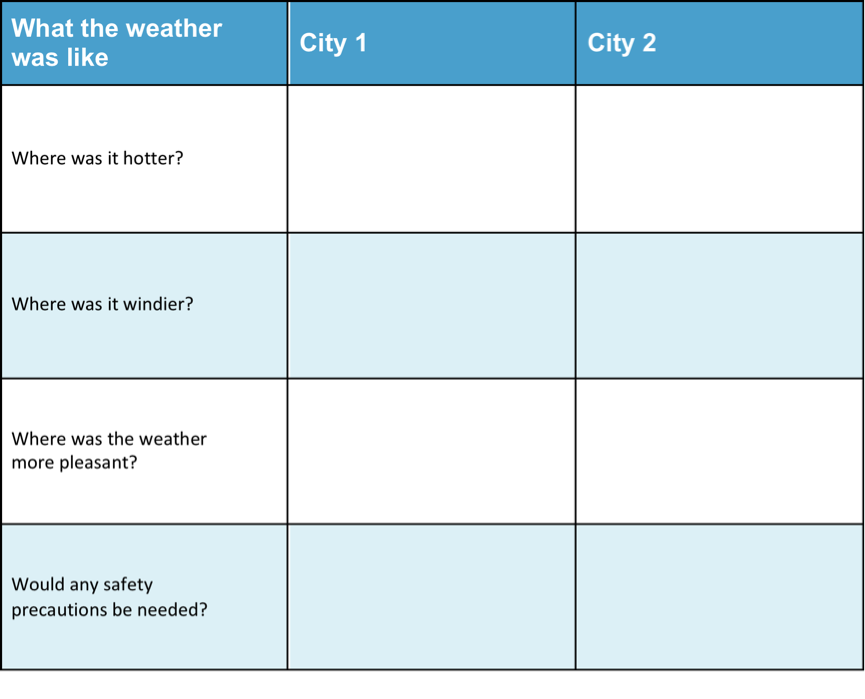Information for Teachers
Curriculum links
Australian Science Standards
PS (ACSSU49) Changes due to heating and cooling
GS (ACHASSK068) The main climate types of the world and the similarities and differences between the climates of different places
DT (ACTDEK013) Suitability of materials, systems, components, tools and equipment for particular purposes
New Zealand Science Achievement Objectives
PW: The effect of forces (contact and non-contact) on the motion of objects
PW: Materials can be manipulated and/or transformed to enhance the fitness for purpose of a technological product
Helpful websites
You may want to direct your students to some or all of these websites to help with their investigations.
The World Meteorological Organization home page has a useful map that students can click on to see current weather conditions and weather information for places all around the world.
http://worldweather.wmo.int/en/home.html
NASA has useful explanations about different weather conditions and the relationship of weather to the climate.
https://climatekids.nasa.gov/menu/weather-and-climate/
Students can use these search words: city name + weather, weather forecast, weather radar, weather warnings, climate, weather forecast, weather records.
How to search the internet
1 Keep your request short
Fewer words will give a more accurate search.
2 Choose exactly what you want
For example: Arctic Circle Climate
3 Use quotes
Double quotes around a set of words tell the search engine to consider those exact words in that exact order without any change. For example: “Arctic Circle Climate”
4 Use the plus sign (+)
If you add a plus sign (+) between words, the internet will search for all the words. For example: migrate+birds+whales+mammal
5 Use the minus sign (–) to say what you don’t want
Use a minus sign (–) to show words you do not want to appear in your results. For example: if you search for burrowing animals and do not want mammals in your search, –mammals will exclude mammals. Note that you need to put a space before the minus sign for the word to be excluded.
6 Be very clear about what you don’t want
Part 1
Ask questions and make predictions
After reading The Weather Today, you may have many questions about the weather.
List your questions
- Compare your list with questions that others have.
- Choose a question you would like to investigate.
- You can work alone, with a partner, or in a small group.
You may want to choose one or more of these questions to investigate
Q1. What is the weather like today where you live?
Q2. What is the weather like in other parts of the world today?
Q3. Why is weather different in different places on the same day?
Go to Part 2 Plan and investigate →Part 2
Plan and investigate
Do searches in the internet or in books or talk to people who can help to find the information you are looking for.
Your teacher may suggest suitable websites for further information.
Go to Part 3 Record and analyse data →Part 3
Record and analyse data
Find a way of recording your information that will allow you to see any patterns in the data.
Collect data for a week about the weather in the cities you are comparing.
Data Chart for comparing weather in different cities
 Download Chart
Download Chart
Go to Part 4 Evaluate the information →
Part 4
Evaluate the information
1. Look over the information you have gathered and the patterns you have found.
What is the weather like in each city?
Where was it hotter or colder? Where was it windiest?
Which city had the most pleasant weather?
What safety precautions would need to be taken in each place?
Where would you have preferred to spend the week?
2. Search for other patterns.
What does this information tell you about what the weather might be like for the next week in each city?
Why is the weather different in different parts of the world?
3. Makes notes about what you find.
Go to Part 5 Communicate and share ideas →Part 5
Communicate and share ideas
Look over all of the information that you have gathered in your investigation.
What are the most important ideas about your topic?
Make a chart showing the most important ideas.
 Download Chart
Download Chart
← Return to menu
